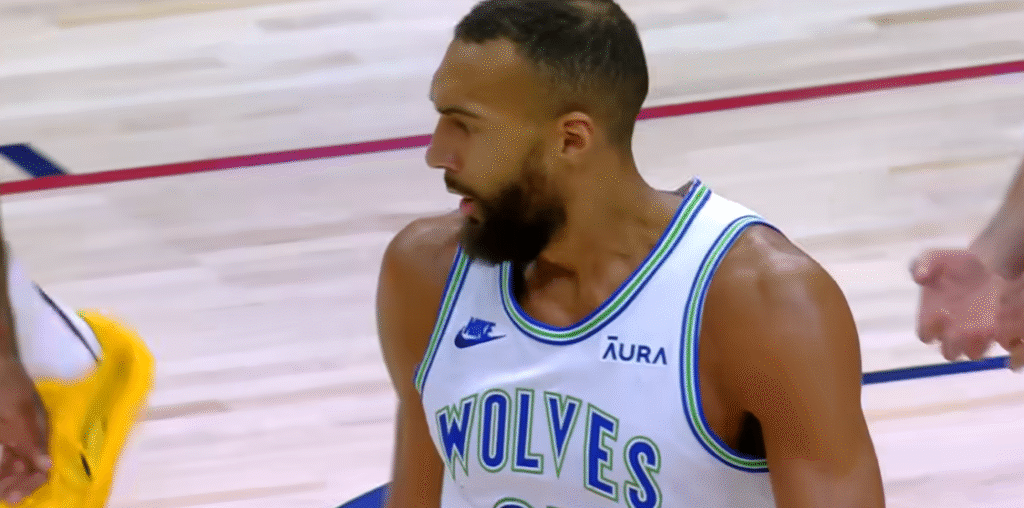Over the past few weeks, the Rudy Gobert controversy has spread well beyond basketball courts and into the unvarnished world of personal pain. In an already strong postseason spotlight, the Minnesota Timberwolves center added a very personal story by confirming his split from longtime girlfriend Julia Bonilla, who is expecting their second child. The timing was nearly dramatic for the public, teammates, and fans. For Gobert, it was the jagged edges of actual life.
Behind the scenes, Gobert and Bonilla had been discreetly starting a family. Romeo, their kid, just turned one year old. They presented an image of fashionable unity during their public appearances, particularly during the 3.Paradis Menswear show during Paris Fashion Week. However, this famous romance’s façade quickly fell apart. Unverified rumors that Gobert had requested Bonilla and Romeo to vacate their shared residence at the start of the Timberwolves’ postseason campaign coincided with his declaration. The emotional repercussions has undoubtedly been public, even if Gobert has rejected the allegations, calling them “inaccurate.”
| Full Name | Rudy Gobert-Bourgarel |
|---|---|
| Date of Birth | June 26, 1992 |
| Age | 32 |
| Height | 7 ft 1 in (2.16 m) |
| Nationality | French |
| Current Team | Minnesota Timberwolves |
| Position | Center |
| Former Partner | Julia Bonilla |
| Children | Romeo (1 year old), one unborn |
| Profession | Professional Basketball Player |
| Awards | 3× NBA Defensive Player of the Year |
| Estimated Net Worth | $60 million |
| Reference | people.com/rudy-gobert-shares-photo-with-his-son |
A very genuine answer was given by Bonilla, who published a moving statement on Instagram. She said, “I left everything for him,” explaining how she moved, made investments, and eventually felt emotionally stuck. Women who were walking similar pathways of sacrifice, silence, and unexpected loneliness could relate to the weight of her remarks. Her dedication on protecting Gobert’s reputation was especially heartwarming; she stated, “Despite how I have been treated, I choose to protect his name for the sake of my children.”

Bonilla demonstrated elegant and potent emotional intelligence by opting for restraint rather than retribution. Her self-control was particularly successful in changing the topic from rumors to sincere sympathy. She wrote in her comments that she stood by Gobert “when everyone criticized him,” probably alluding to his contentious NBA reputation—he was once anonymously chosen as the league’s most overrated player. Her devotion, described in agonizing detail, gave her heartbreak legitimacy.
In the meantime, Gobert carefully worded his own account of what happened. He stated, “Julie and I are going through a difficult process right now of redefining our coparenting relationship.” Even if the tone of that specific line was remarkably similar to the media-coached language used in other celebrity splits, it still felt genuine. Gobert’s image was further softened by the accompanying Instagram photo showing him playing with Romeo, a sun-drenched father-son encounter. Gobert wasn’t a strong defensive anchor in the frame. All he was doing was trying to keep something fragile together as a father.
This change in the public discourse coincides with a more comprehensive perspective on professional athletes. Basketball fans used to not give a damn about a player’s personal life unless it involved scandal. However, there has been a noticeable change in the last ten years. Athletes like Stephen Curry and LeBron James have demonstrated that marriage, fatherhood, and being genuine off the field can raise rather than lower an athlete’s public profile. That changing norm is reflected in Gobert’s attempt to manage parenthood amid a crucial playoff run.
Gobert is one of several athletes who are challenging the antiquated stereotype of the emotionally aloof athlete by displaying such vulnerability. This cultural change toward emotional honesty is reflected in his assertion that parenting is “one of the most profound and meaningful experiences.” Men, particularly public characters, can now be multifaceted—tough on the court, compassionate at home—thanks to noticeably better public conversation.
However, Gobert and Bonilla’s emotional break represents more than just a personal story. It demonstrates the strains put on public celebrities’ partners, especially those who move and withdraw to support their demanding careers. The sense of being “far from my family and friends” that Bonilla expresses is quite similar to that of other partners of athletes and entertainers—women who give up their social bases out of loyalty and love. That dynamic, which is frequently overlooked, merits consideration.
The Gobert split has generated quiet discussion in NBA circles. Despite their apparent silence, players and insiders are said to be aware of the emotional toll this took on him. The situation was “a distraction, but not a derailment,” according to one league source. Gobert has maintained his composure during games despite his personal life collapsing off the court because to his remarkably strong focus and performance under duress.
Surprisingly, public opinion is evenly split. Others sympathize with a man dealing with fatherhood, work pressure, and personal dissolution all at once, while others have chastised Gobert for what they see as insensitivity. Instead of being a minefield in these situations, social media has become a forum where fans discuss co-parenting, emotional labor, and whether or not public personalities should be evaluated through personal prisms.
Both Gobert and Bonilla have demonstrated maturity throughout it all. Neither has brought their child into the spotlight or fed the press with mudslinging. They have provided a crash course in grieving under scrutiny by managing the situation with nuanced, careful communication. It’s an uncommon and, in many respects, quite effective method of handling personal crises; younger public people should take a cue from it.
Gobert’s life off the court is still being delicately rebuilt as his Timberwolves are ready to compete for Western Conference supremacy. He is creating a new narrative by tying his identity to parenting and declaring his intention to “support the well-being of all the people I care about,” one that might eventually drown out the clamor. Every post, every silence, and every attempt to improve upon yesterday have impacted the ongoing process.
For the time being, Rudy Gobert and Julia Bonilla’s split serves as more than just tabloid material; it is also a lesson in parental duty, emotional fortitude, and the silent strength of being silent when the need to yell is most. Their public and difficult journey serves as a reminder that every box score has a narrative that is replete with the same uncertainty, hope, and longing that characterizes each and every one of us.
